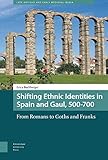Shifting ethnic identities in Spain and Gaul, 500-700 : from Romans to Goths and Franks / Erica Buchberger.
Material type: TextSeries: Late antique and early medieval Iberia ; 4.Publisher: Amsterdam : Amsterdam University Press, [2017]Copyright date: ©2017Description: 1 online resource (218 pages)Content type:
TextSeries: Late antique and early medieval Iberia ; 4.Publisher: Amsterdam : Amsterdam University Press, [2017]Copyright date: ©2017Description: 1 online resource (218 pages)Content type: - text
- computer
- online resource
- 9789048527441
- 9048527449
- 9048551242
- 9789048551248
- Ethnology -- Rome
- Ethnology -- Spain
- Ethnology -- Gaul
- Romans
- Gauls
- Franks
- Ethnologie -- Italie
- Ethnologie -- Espagne
- Ethnologie -- France
- Romains
- Francs
- SOCIAL SCIENCE -- Discrimination & Race Relations
- SOCIAL SCIENCE -- Minority Studies
- Ethnology
- Franks
- Gauls
- Romans
- Europe -- Gaul
- Rome (Empire)
- Spain
- 305.80093763 23
- DG190 .B83 2017eb
| Item type | Home library | Collection | Call number | Materials specified | Status | Date due | Barcode | |
|---|---|---|---|---|---|---|---|---|
 Electronic-Books
Electronic-Books
|
OPJGU Sonepat- Campus | E-Books EBSCO | Available |
Originally presented as the author's thesis (doctoral) -- University of Oxford.
Includes bibliographical references (pages 189-211) and index.
Cover; Contents; Acknowledgements; Introduction; Scholarly Tradition; Methodology; Chapter Breakdown; Terminology; Part I -- From a Roman to a Gothic World in Visigothic Spain; 1. Arians to Catholics; John of Biclar's Chronicle; Isidore of Seville's History (up to 589); The Third Council of Toledo; The Lives of the Fathers of Mérida; Conclusion: The Evidence Together; 2. Church and State: Isidore and his Influence; Isidore's History (post-589); Church Councils to 654; Conclusion; 3. The Later Seventh Century; Chindaswinth, Recceswinth, and Visigothic Law; Later Councils and Laws; Conclusion.
Part II -- From a Roman to a Frankish World in Merovingian Gaul4. Gregory of Tours; The Late Roman Empire and Clovis' Reign; Contemporary Era; Conclusion; 5. Venantius Fortunatus; Duke Lupus; Leontius II of Bordeaux; The Ruricii; Vilithuta; Duke Launebod; King Charibert; Radegund; Conclusion; 6. Fredegar; Book Three: Rewriting Gregory; Book Four: Fredegar's Original Work; Conclusion; 7. Frankish Hagiography; Caesarius of Arles; Gaugeric of Cambrai; Eligius of Noyon; Conclusion; Conclusion; Abbreviations; Bibliography; Index.
Traditional scholarship on post-Roman western culture has tended to examine the ethnic identities of Goths, Franks, and similar groups while neglecting the Romans themselves, in part because modern scholars have viewed the concept of being Roman as one denoting primarily a cultural or legal affiliation. As this book demonstrates, however, early medieval 'Romanness' also encompassed a sense of belonging to an ethnic group, which allowed Romans in Iberia and Gaul to adopt Gothic or Frankish identities in a more nuanced manner than has been previously acknowledged in the literature.
Print version record.
In English.
eBooks on EBSCOhost EBSCO eBook Subscription Academic Collection - Worldwide
There are no comments on this title.

